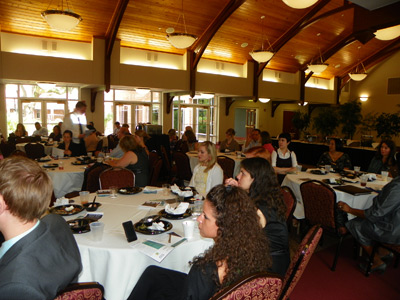Emphasizing Relationships and Trust in Crisis Communications
| Written by: Lauren Antista

Roy Reid, APR, CPRC, partner with Consensus Communications gave a fresh perspective on crisis communications, at FPRA’s Capital Chapter July membership luncheon, emphasizing relationships and trust. Mr. Reid outlined the fundamentals of crisis communications, the changing landscape of relationships in the current marketplace and the value and condition of trust.
He pointed to a major shift in society and the economy in which a “consumer” of information has been transformed into a “stakeholder.” And, the currency for stakeholders is trust (that must be earned). Channels of communication have likewise shifted from a relatively linear dissemination of news and information to multiple channels communicating and exchanging information simultaneously.
Mr. Reid laid out a business model that pointed to better relationships leading to better results through: 1.) Cultivating outrageous trust; 2.) Building market leadership; and 3.) Executing effective advocacy. When implemented, these help to maintain and protect interests through good times and bad. In particular, cultivating outrageous trust can lead to the development of leadership, culture and relationships ready for any crisis.
To cultivate outrageous trust, it is important to understand how trust works. According to Mr. Reid this could be broken down into a simple formula: (emotional connection) + (experience with people) = belief. And when the attributes of outrageous trust (be trustworthy, be authentic, be dependable, be influential) are successfully implemented, the valuable Return on Investment (strength of character, peace of mind, improved personal performance, greater internal loyalty and customer/client loyalty, benefit of the doubt and an enhanced brand) are well worth the effort.
Mr. Reid’s daily guiding principles of outrageous trust to keep in mind, include:
1. Take responsibility for every relationship;
2. Build trust from the inside out;
3. Be intentional and lead with trust;
4. Communicate consistently;
5. Be a good steward with your trust;
6. Deal with issues now and ask the hard questions;
7. Equip and train yourself and others to build and cultivate trust; and
8. Fight for what’s important.
Feel free to download the presentation slides, as well as Roy’s “Outrageous Trust” handout.
